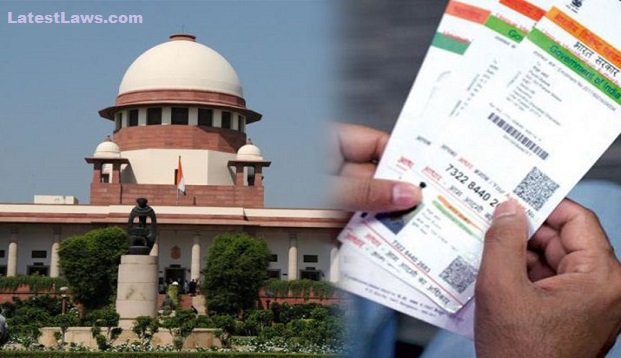September 26,2018:
On Thursday, Supreme Court expounded that,"Aadhaar is constitutionally fair and gives “dignity to the marginalised”.
SC Bench delivered the verdict on a batch of petitions against Aadhaar.
Justice A K Sikri, Justice Ashok Bhushan in a majority judgement with CJI Dipak Misra and Justice A M Khanwilkar has upheld validity of Aadhaar, but with conditions. Justice Chandrachud gave his minority dissenting Judgment.
SC Bench will deliver three judgments, one by Justice A K Sikri with whom CJI Dipak Misra and Justice A M Khanwilkar agree; other two judgments by Justices D Y Chandrachud and Justice Ashok Bhushan.
Mobile companies, schools and banks cannot ask for Aadhaar now. Aadhaar will also not be needed for CBSE and NEET admissions. But it will be a must for PAN and IT returns.
Apex Court enunciated that order to link all the mobile phone connections to Aadhaar was ‘unconstitutional’.
SC Bench added that there was no need to link bank accounts with the unique identification number.
Supreme Court's Five-Judge Constitution Bench headed by CJI Dipak Misra expounded that,“There is a legitimate goal and requirement to have the Aadhaar law”.
Justice AK Sikri stated that,“It’s better to be unique than be best, it’s the central message of Aadhaar"..
Bench stated that the identity project had strict regulations to collect citizens’ biometric data and has a sufficient defence mechanism.
Justice Chandrachud in his minority dissent statement accepted every argument raised by petitioners challenging validity of Aadhaar and runs a judicial razor mercilessly through Aadhaar Act virtually declaring it unconstitutional in toto.
He stated that,"It is very difficult to live in contemporary India without Aadhaar as all schemes have been linked with Aadhaar", and declared Aadhaar scheme unconstitutional.
Justice Chandrachud added that Aadhaar violates privacy rights as it could possibly lead to profiling of persons and voters.
There is a risk of surveillance of people on the basis of data collected under Aadhaar scheme and the data could be misused, stated Justice Chandrachud.
Justice Chandrachud stated that,"Aadhaar scheme does not provide robust mechanism to get consent of citizens before collecting their demographic and biometric data".
Justice Chandrachud further stated that Aadhaar has serious problems about exclusion and right to benefits cannot be made to depend on authentication of Aadhaar.
Justice Chandrachud explained that,"Aadhaar Law is unconstitutional on the very ground that it was passed as Money Bill. Aadhaar Act cannot be treated as Money Bill. Passing a bill as Money Bill which is not a money bill is a fraud on constitution.
Justice Chandrachud added that Speaker was wrong in classifying Aadhaar Bill as a Money Bill as it denuded the federal structure of law making by limiting the role of Rajya Sabha in Aadhaar Bill.
Petitioners main contention was that Aadhaar encroached on privacy of the citizens because it entailed collection of fingerprints, iris scans and other details of citizens with/without their consent.
Government had rejected criticism of Aadhaar, the 12-digit Unique Identification Number that’s now compulsory for linking of bank accounts, mobile phone numbers, and filing income tax returns, saying it ensures misuses of social welfare benefits and counters black money and money laundering. Aadhaar data, government is safe and cannot be breached, the government and Aadhaar Aadhaar UIDAI have said.
Supreme Court had in August 2017 ruled individual privacy is a “guaranteed fundamental right” in the Constitution, giving hope to critics who contend that Aadhaar helps government spy on people by “tethering every resident of India to an electronic leash.”
Read Judgment @LatestLaws.com:
Supreme Court Judgment on Validity of Aadhaar (Download PDF)
Picture Source :

























